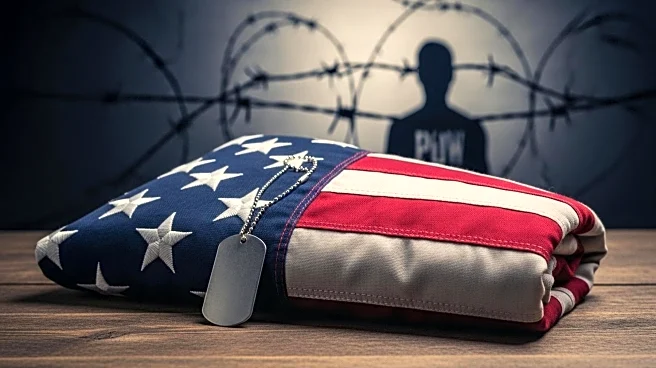What is the story about?
What's Happening?
Alfonso Antonio Garizio, a World War Two veteran who served in the 1st Battalion Cambridgeshire Regiment, spent three years as a prisoner of war in East Asia. His daughter, Gillian Powell, recently laid a wreath on his behalf at Colchester Castle to commemorate the 80th anniversary of VJ Day. Garizio was captured after the fall of Singapore in 1942 and forced to work on the Burma-Thailand railway, known for its harsh conditions and high mortality rate among POWs. Despite surviving the ordeal, Garizio rarely spoke about his experiences, a common sentiment among veterans who were advised not to discuss their wartime experiences upon returning home.
Why It's Important?
The story of Alfonso Garizio sheds light on the often overlooked psychological impact of war on veterans. Many POWs like Garizio were advised to remain silent about their experiences, which may have contributed to long-term psychological distress. This silence has implications for understanding the mental health challenges faced by veterans and the importance of acknowledging their sacrifices. The commemoration of VJ Day serves as a reminder of the 'forgotten army' and the need to honor their contributions and struggles, both physical and psychological.
What's Next?
The continued recognition of veterans' experiences, such as through memorials and anniversaries, plays a crucial role in ensuring their stories are not forgotten. Efforts to support veterans' mental health and provide platforms for sharing their experiences can help address the long-lasting effects of war. As society becomes more aware of these issues, there may be increased advocacy for veteran support services and historical education to preserve their legacy.
Beyond the Headlines
The silence imposed on veterans like Garizio raises ethical questions about how societies deal with the aftermath of war. It highlights the need for cultural shifts in how veterans are supported and remembered. The long-term effects of such silence may influence current policies on veteran care and mental health support, emphasizing the importance of open dialogue and acknowledgment of past traumas.


















